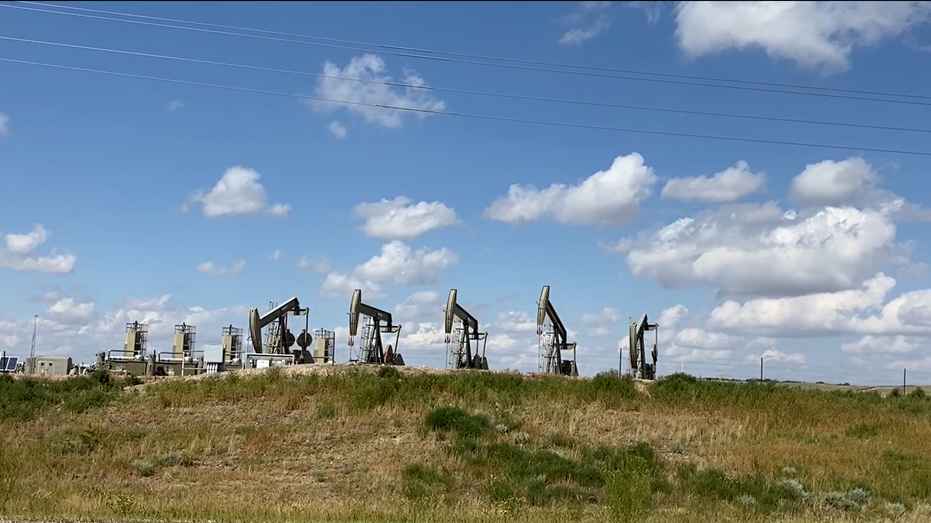Biden budget would repeal fossil fuel tax breaks in move expert says could discourage investment, cost jobs
Biden says budget aimed at restoring fiscal responsibility, cutting inflation
Mike Sommers: This war is going to be won with US oil and natural gas
American Petroleum Institute president and CEO weighs in on the U.S. boosting LNG to Europe on 'Kudlow.'
President Biden wants to repeal a set of tax preferences for the fossil fuel industry, according to his budget – a move that is likely to be lauded by Democrats but may handicap energy development in the U.S., critics say.
Biden released his Fiscal Year 2023 budget Monday morning. In his remarks, he touted "fiscal responsibility" and an attempt at "reducing inflationary pressures and making real headway cleaning up the fiscal mess I inherited."
"It makes prudent investments in economic growth, a more equitable economy, while making sure corporations and the wealthy pay their fair share," Biden said of his budget.

President Biden speaks during a meeting with German Chancellor Olaf Scholz in the Oval Office of the White House on Feb. 7, 2022. (AP Photo/Alex Brandon / AP Newsroom)
AVERAGE GAS PRICES COULD FALL UNDER $4 IN COMING WEEKS, EXPERT SAYS
Page 131 of the president's budget details some tax increases the president spoke about, to "[e]liminate fossil fuel tax preferences."
The provisions that would be repealed include the enhanced oil recovery tax credit, the expanding of intangible drilling costs, the expensing of mine exploration and development costs, and more. According to the White House, this would save just over $3.4 billion in 2023 and over $40 billion over a 10-year period.
But American Petroleum Institute (API) senior vice president for policy, economics and regulatory affairs Frank Macchiarola said the proposal contradicts recent Biden administration calls for more energy production.
"While the administration has said in recent weeks that in this moment of crisis we need more oil and gas supply, they are now proposing to eliminate an IDC tax provision that is specifically designed to attract investment in oil and natural gas development and is similar to tax provisions industries across the economy receive," he told Fox News Digital. "We again call on the Biden administration to adjust their policies to match their rhetoric."
The libertarian CATO Institute's director of tax policy studies, Chris Edwards, told Fox News Digital that, as with many energy policies, Biden's proposal would take a while to affect U.S. energy output. But, he said, those changes could immediately hurt jobs and cut investment in domestic energy – and they pale in comparison to green energy tax breaks.

Oil well equipment on the Forth Berthold Indian Reservation near New Town, North Dakota. (Tyler Olson/FOX Business)
"The left likes to complain about the fossil fuel preferences… The first thing to note about them is that the dollar value is very small now compared to the renewable energy tax credits and other special breaks for solar and wind and that sort of thing," Edwards said.
RECORD-HIGH DIESEL PRICES ‘PUTTING A PINCH ON FLEETS’ ACROSS THE US: TRUCKING INDUSTRY OFFICIAL
"If you change incentives, if they repeal all these energy items now, it would or could immediately affect the amount of capital expenditures in the industry, which of course, would affect people's jobs right away," Edwards continued. "So it wouldn't necessarily affect the supply of oil and gas immediately, but it would affect, you know, people's jobs and investment in the industry right away."
Edwards also highlighted a significant difference between conservatives and liberals over what constitutes a tax break. And he said the energy-related preferences Biden would repeal don't really count as tax breaks in his mind.

Oil wells outside of Williston, North Dakota, on August 24, 2021. (Tyler Olson/FOX Business / FOXBusiness)
"The Biden people would repeal expensing of intangible drilling costs," Edwards added. "Well, conservatives or libertarians like me think if this is a business expense, it ought to be immediately written off, whereas the liberals think you ought to amortize things over many years."
GET FOX BUSINESS ON THE GO BY CLICKING HERE
Edwards added: "A few of these the energy items might be true loopholes… But many of them are actually not."
Presidential budgets are largely political documents intended to communicate priorities, rather than to be enacted on their own. But the fact Biden is still including the changes in fossil fuel taxes in his budget amid increased gas prices and the global energy anxiety stemming from the Russian war on Ukraine is notable.
The White House did not immediately respond to a request for comment.
Biden also proposed essentially the same changes last year, but they were not enacted by the Democratic Congress. Liberals at the time praised the president for the move, including the Natural Resources Defense Council (NRDC).
"In addition to ending unfair advantages that benefit the fossil fuel industry and bilk taxpayers, the proposal will accelerate the country’s move away from dirty oil, gas and coal," the NRDC said at the time. "Despite their wealth, fossil fuel companies have long benefited, at the taxpayer’s expense, from a host of special tax benefits in the U.S. tax code that lower the cost of doing business and raise their profits."





















